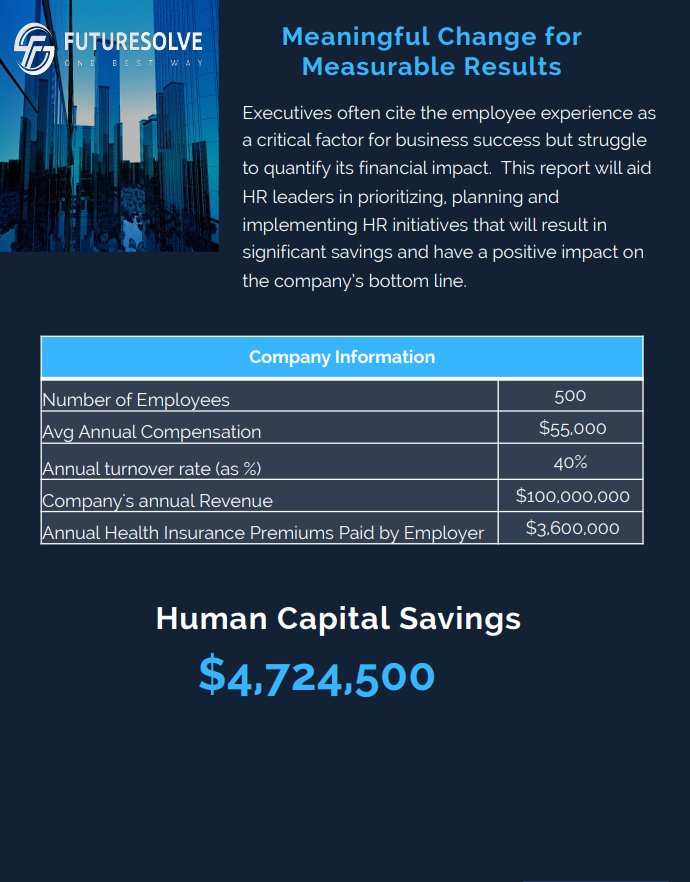Embarking on a new role as an HR leader is both an exciting and challenging endeavor. The first 100 days are crucial for setting the tone and laying the groundwork for long-term success. Here, we outline the three keys to success that every new HR leader should focus on during this critical period. (Please feel free to contact us at FutureSolve to discuss our 100 Day Checklist.)
1. Get to Know the Business and Key Stakeholders
Know the Industry and Your Company’s Role
Understanding the industry in which your company operates is essential. Familiarize yourself with the market dynamics, competitive landscape, and emerging trends. Grasp how your company fits into this ecosystem and what sets it apart.
Understand the Business Model and Profitability Levers
Dive deep into your company’s business model. Identify the primary revenue streams and cost drivers. Understand the key levers that influence profitability and how HR can impact these areas positively.
Grasp the Long-Term Strategy and Short-Term Goals
Aligning HR initiatives with the company’s long-term strategy and immediate business goals is vital. Know the overarching vision and the milestones along the way. This knowledge will guide your strategic planning and operational decisions.
Identify and Engage Key Stakeholders
Map out the key stakeholders both within and outside the organization. Understand their roles, influence, and what they value most. Building strong relationships with these stakeholders will be crucial for gaining support and driving HR initiatives forward.
Download this article
2. Build Credibility and Trust
Build Effective Relationships
Invest time in building relationships with the executive team, HR team, frontline leaders, and employees. Understanding their needs and perspectives firsthand will help you tailor your approach and foster collaboration.
Listen and Ask Questions
Conduct roundtable meetings with a cross-section of employees from various levels and departments. Listening to their insights and concerns will provide valuable information and demonstrate your commitment to understanding the organization.
Engage in Candid Conversations
Be authentic and transparent in your interactions. Share your observations openly and invite feedback. This openness will help build trust and show that you are genuinely invested in the company’s success.
Create Quick Wins
Identify and execute a few initiatives that can deliver immediate positive results. Demonstrating your ability to drive tangible outcomes early on will help establish your credibility as a responsive and results-oriented leader.
3. Set Your Strategic and Operational Agenda
Leverage Your Knowledge Post-100 Days
After your initial 100 days, utilize your deepened understanding of the business strategy and culture to craft a robust people strategy. This strategy should aim to maximize performance and agility across the organization.
Build a Winning Leadership and HR Team
Assemble a team that shares your vision and complements your strengths. Focus on developing leaders within HR and across the organization who can drive the people strategy forward effectively.
Execute and Refine Your Strategy
Implement your strategic initiatives with a focus on continuous improvement. Regularly assess the impact of your actions and be ready to adjust your approach based on feedback and changing business needs.
Tips and Derailers
Tips for Success:
- Keep it Simple: Focus on a few key imperatives that add the most value.
- Stick to Key Imperatives: Prioritize actions that align with strategic goals.
- Be Patient and Flexible: Change takes time; be ready to adapt as needed.
Potential Derailers:
- Trying to Fix Everything at Once: Focus on high-impact areas rather than spreading yourself too thin.
- Failing to Understand the Business: Dive deep into the business to ensure your strategies are relevant.
- Not Enlisting Key Stakeholders: Engage stakeholders early and often to build support.
- Relying on Past Wins: Avoid overemphasizing previous successes; tailor your approach to the current context.
In conclusion, the first 100 days are a pivotal period for new HR leaders to establish themselves and set the stage for long-term success. By getting to know the business and key stakeholders, building credibility and trust, and setting a clear strategic agenda, you can navigate this critical time effectively. Remember, the team at FutureSolve is here to support you—contact us to discuss our 100 Day Checklist and how we can help you succeed.
Download This Article






























